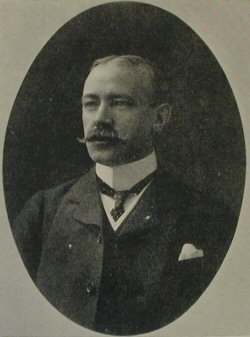
THE senior partner in the legal firm of Black, Honeyman, &
Monteath was born in Glasgow, 23rd December, 1857. He represents the Blacks in
Abington, a very old Upper Ward Lanarkshire family, and by the marriage of an
ancestor has Huguenot blood in his veins. His great-grandfather was the first of
the family to settle in Glasgow, and his portrait and those of many of his
relations are in Mr. Black's possession, and were exhibited at the Old Glasgow
Exhibition of 1894. A grand-uncle founded the firm of Black & Wingate, and his
father's cousin the firm of James Black & Co. He was educated at Glasgow Academy
and the Albany Academy, and at Glasgow University, in all of which he took
prizes.
One of these was a special award at the University for an
essay on the "Influence of the Renaissance on European Literature." He studied
also at Gottingen in 1879. In 1884 he became a partner in his father's firm of
Black, Honeyman, & Monteath, a firm which under two or three firm names is over
a century old.
He has contributed to the Glasgow Herald on legal and
archaeological subjects, and his work has also appeared in Blackwood's Magazine,
the Athenaeum, the Antiquary, the Scottish Law Review, and other periodicals. In
1878 a paper by him on curative charms and spells, under the title of "Folk
Medicine," was read before the British Archaeological Association. At the
request of the Folklore Society, of which he was one of the founders, he wrote a
book on the same subject, which was published in 1883. Its reception was
flattering both at home and abroad, and it was translated into Spanish. In 1880
Mr. Black was elected joint honorary secretary with Mr. J. D. G. Dalrymple of
the Glasgow Archaeological Society, and the later activity of that body is
largely due to the new blood thus introduced. Among other papers which Mr. Black
contributed was one on "The Derivation of the name Glasgow," and is account of "
David Dale's house in Charlotte Street" appears in one of the volumes published
by the Regality Club. In 1884 he published a small volume on the Law Agents' Act
of 1873, which was favourably received by the profession.
Two years later he acted as joint agent for the Hillhead and
Kelvinside Annexation Bill, and as Glasgow Secretary for the Edinburgh
International Exhibition of 1886, when he had the honour of being presented to
Queen Victoria. He also took an active part in the agitation against Mr.
Gladstone's Home Rule Bill, both as Secretary of the Liberal Unionists of the
Central Division and as election agent for Mr. Vary Campbell in the College
Division.
For many years he took great pleasure in visiting Heligoland,
where a singularly cosmopolitan society was gathered during the summer months.
His book on "Heligoland and the Islands of the North Sea," is probably the
finest description in English of the Frisian people and their legends, and was
translated into German. On the death of his uncle in 1867 he had become owner of
the estate of Annathill, and as a Commissioner of Supply for Lanarkshire his
interest in the complicated state of local government of that time led him to
contribute a paper on the subject to the Law Magazine and Review, which was
afterwards published separately. He had also succeeded his father as Clerk to
the Heritors of Govan, and the problems encountered in that office led to the
writing of his volume on the "Parochial Ecclesiastical Law of Scotland," which
has gone through three editions. In the last of those he incorporated a work on
the history of tithes in Scotland, previously published under the title of "What
is Teinds?" in 1893. His reputation for knowledge of such branches of law has
led to his appearance in many sheriff courts in cases relating to manses and
churches. He is an elder of Park Parish Church, and a member of various
committees of the General Assembly.
Among his other works are: "The Law relating to County
Councils," 1889; "A Digest of Decisions in Scottish Shipping Cases, 1865-1890,
with Notes," 1891; "A Handbook of Scottish Parochial Law other than
Ecclesiastical," 1893; and contributions to the Dictionary of National Biography
on the lives of Old Mortality and others.
In 1896, on the invitation of the Faculty of Divinity of
Glasgow University, he delivered a series of lectures on "Parochial
Ecclesiastical Law" to the Divinity students at Gilmorehill, and he is a
Vice-President of the Church Law Society. During his youth he was an active
member, and for a time Vice-President, of the Juridical Society, and he is now
an honorary member. In 1886, in conjunction with Mrs. Parker Smith, he formed
the Women's Liberal Unionist Association, and he is a Vice-President of the West
of Scotland Liberal Unionist Association. He contested the South Division of the
City of Aberdeen against the Right Hon. James Bryce at the General Election of
1906, and subsequently went on a tour of eight months round the world. With the
Rev. the Hon. arthur Gordon, B.D., he represented the Church of Scotland at the
General Assembly of the Presbyterian Churches of India held at Indore in
December, 1906. He is a Governor of Baillie's Institution, and a member of
Council of the Regality Club, and of the Master Court of the Weavers'
Incorporation. He is a member of the New, Art, and College Clubs, Glasgow; the
University Club, Edinburgh; and the Royal Societies Club, London. His hobbies
are travel and book collecting. He married in 1899 Miss Anna Robertson Blackie,
daughter of the late Mr. Robert Blackie, of Blackie & Sons, publishers, and
niece of the late Lord Provost Blackie, and she takes a keen interest in
philanthropic work in Glasgow.
Back to
Index of Glasgow Men (1909)